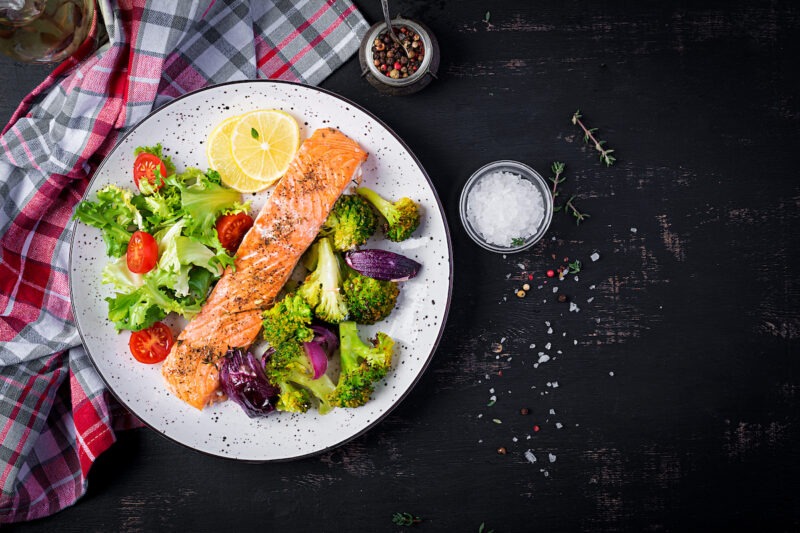Then and now in BC’s salmon farming industry
Putting the evolution of BC’s salmon farming techniques in perspective so it makes sustainable sense on our dinner tables.
Commentary
By Samantha Bacchus McLeod
There are four key components we have to use as metrics once we have made the decision to track how our food is grown: environmental impact, sustainable practices, technological innovations, and last but certainly not least, overcoming misconceptions.
Environmental Impact:
When it comes to the environmental impacts of salmon farming, we can compare it to something as simple as our gardening in the summer months. Every year we learn something new and innovative, and we implement those changes to get the best results without damage to the environment. In the past, we might have struggled with keeping pests away and maintaining the soil’s health.
Traditional open-net salmon farming faced similar challenges, with concerns about waste buildup and disease spreading in and from the surrounding waters. The approach to salmon farming and vegetable gardening are not that different once we put it in perspective.
For example, we upgraded our gardens with wildlife protection barriers, smart sensors, and composting techniques to monitor the garden and improve the soil and the health of our edibles.
Modern open-net salmon farms in British Columbia also use advanced monitoring systems and waste management practices to protect the ocean’s well-being, while raising healthy salmon.
Sustainable Practices:
Sustainable practices is key to everything in life, from how we budget for our retirements to cooking for our families. As chefs, passionate cooks, and environmentally conscious diners, we learn about our food through traceability and its social and environmental impacts. But, this is only possible if the food-producing companies are transparent with their practices and information, and salmon farmers certainly are amongst those transparent companies.
Let’s think about a favourite recipe that calls for fresh ingredients. Traditionally, we might have relied on ingredients that were not always sustainable or environmentally friendly. Similarly, in the past, salmon farming depended heavily on wild-caught fish for feed, which raised concerns about overfishing.
But just as we have adjusted our recipes to use ethically produced, locally sourced, sustainable ingredients, modern open-net salmon farming in British Columbia has adjusted too. They now incorporate innovative feed formulations like the use of plant-based ingredients and alternative protein sources, to reduce its ecological footprint and support a healthier marine ecosystem.
Technological Innovation:
Consider the evolution of personal devices like smartphones. Remember the first mobile phones and the 1992 flip phone that seemed so technologically advanced? Well, from then to now, it is a proven fact that tech is the one industry that is growing in mind-blowing leaps and bounds.
In the past, basic cell phones served their purpose, but modern smartphones equipped with advanced features and capabilities have revolutionised how we communicate and interact with technology. Let’s just take a glance at our smartwatches on our wrists and cease to wonder.
Similarly, technological advancements in open-net salmon farming have transformed traditional practices. With underwater cameras and real-time monitoring systems, farmers can now keep a close eye on the health and behavior of their salmon, much like how we can track our fitness goals with our smartwatches. These innovations allow for proactive management and optimisation of farm operations, ensuring healthier and more sustainable salmon farming practices.
Overcoming Misconceptions:
Overcoming misconceptions about the food we consume means we have to challenge the status quo when it comes to the immediate information at our fingertips.
Imagine rereading a classic book that we had to read decades ago, one filled with outdated information and misconceptions. We cringe when we are confronted with that book today, don’t we? The language is grating on our senses, and the information is so outdated that we are baffled that such tripe could have been written and propagated in our classrooms.
Just as new research and updated editions of books help correct inaccuracies and provide a more accurate understanding of the subject matter, modern open-net salmon farming in British Columbia is challenging old perceptions and quashing myths. We have to read the new edition of this particular “book” and catch up with the tides of time.
We have to use our own initiative and personal experiences to explore and analyse when seeking answers to questions about how our food is grown, and how sustainable the food is on our table. If we do not do our own research, we are left to the mercy of propaganda tossing us around while leaving us completely at sea.
Through innovation, monitoring, and sustainable practices, salmon farmers are rewriting the narrative surrounding aquaculture, much like how a revised edition of a book presents a more informed, contemporary and accurate perspective.
Salmon farmers, especially those in BC, are not only ensuring the industry’s sustainability but also reshaping public perception towards a more positive and environmentally responsible view of aquaculture.

